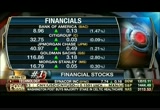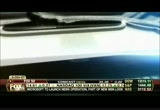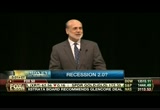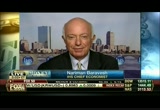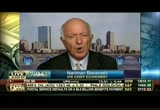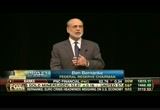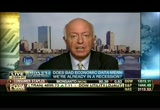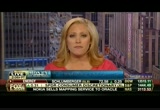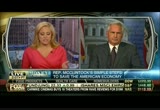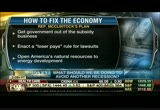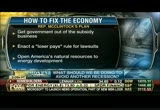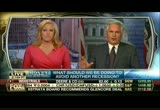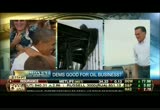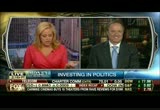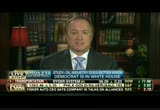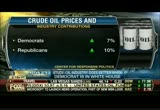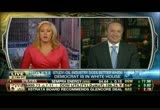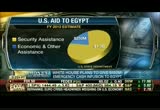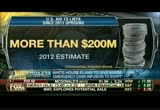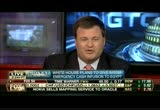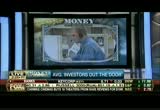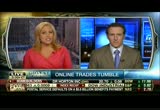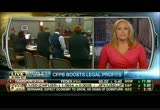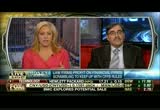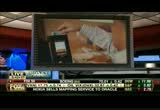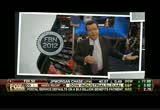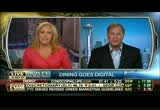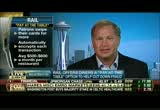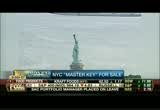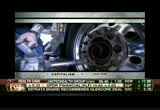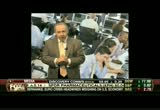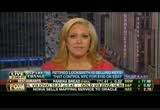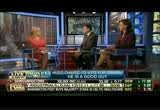tv MONEY With Melissa Francis FOX Business October 1, 2012 5:00pm-6:00pm EDT
5:00 pm
a few months ago it was trading at $95 a share. it is up to 116. some people say it could go a lot further than that. a lot of people think it is a economic indicator. if financials do well the economy could follow. certainly hope so. >> "money" with melissa francis now melissa: i'm melissa francis and here's what's money tonight. is the u.s. actually in recession but we don't even know it yet? recent numbers have been terrible. many say the economy has stalled. we're going to break it down. plus oil companies throw money at mitt romney like there is no tomorrow. but a new study shows their business is actually better with a democrat in the white house. we have the surprising details. two of america's greatest pastimes together. football and victoria secret models. why the nfl blitz by the underwear company might be pure business brilliance. even when they say it's not it is always about money
5:01 pm
melissa: first let's take a look at the day's market headlines a surprise surge in u.s. manufacturing gave stocks a triple digit boost. that was early on though and it trade faded. the dow closed up 77 points. one possible reason, ben bernanke. the fed chairman defended his money printing ways today but he also said congress must do more to ss ace the recovery. american express will pay more than $112 million. regulators allege that amex misled customers about debt collected, discriminated against certain card applicants and charged improper late fees. are we in a recession right here, right now? our own peter barnes asked fed chief ben bernanke today and he sort of made a joke of the whole thing. >> i know how it happens. it sort of happens over a nice meal at a french restaurant and -- [laughter] there is a discussion of the
5:02 pm
data and everybody says, what do you think? yeah, okay. melissa: that is his explanation for how the official committee decide whether or not we're in a recession. he didn't really answer the question it turns out. we get one piece of good news like the manufacturing expanding for the first time in four months. we still have a laundry list of bad numbers. unemployment still above 8%. second quarter gdp revised to near stagnant 1.3% growth. durable goods orders falling 13% in august. the chicago business barometer showing the first contraction in business activity in three years. so what is the truth? why don't we have someone actually willing to answer the question. ihf chief economist. nariman behravesh. thanks for joining us. what do you think of ben bernanke sort of joking about the question? i understand he was trying to lighten up what might be a boring discussion or lunch but it is pretty serious to a lot of people. >> well, he's right the way a recession gets called in the u.s. is by a group of
5:03 pm
sort of pundits behind closed doors. whether it is over french food who knows. that sense it is a bit of a mystery. i will tell you this, all the indicators they look at are not boeing going in the direction that would make them call a recession right now. for example, employment is still positive. gdp still in, growth still in positive territory. you would have to have those in negative territory before we even think about calling a recession. so, it's not great. the numbers are bad as you were just saying but it's not a recession. at least not yet. melissa: i mean we looked at the revision for a second quarter, i believe it was, right? that was 1.3% that was revised downward. it had been four and then 2 1/2 and now all the way down to 1.3. the third quarter is over. is it possible in your mind that the third quarter was negative? >> no. i think our view right now is third quarter probably another 1 1/2ish kind of number. all the indicators suggest that. so third and fourth quarters that is 1 1/2 to two range.
5:04 pm
maybe at lower end of that, not negative. nothing indicates that it is negative. even though we have had numbers that have been bad, basically. melissa: right. >> as you said, the manufacturing numbers are up. consumer confidence is up. interestingly enough. employment is still in positive territory. the friday numbers to be around 140, 150,000 positive. so this does not make a recession. melissa: positive but terrible. i mean you talk about them being, 130 is the consensus. i mean you've got to be much higher than that to get to anything that is going to keep up with the population growth. ben bernanke though did take the question, well, i don't know, i mean he still didn't answer it but sort of took a more serious stab at later on. let me play that and get your reaction on the other side. >> our concern is not really recession. our concern is that growth will continue but at a pace that is insufficient to put people back to work and the longer we go with millions of people out of work and more than 40% of those unemployed have been
5:05 pm
unemployed for at least six months the more people we have whose skills will atrophy. whose ability to find work is going to decline. we'll be creating a permanent group of people who are not fulfilling their full potential in the labor force and that i think is very, very costly. melissa: see that is pretty much exactly what you just said although he started it with doesn't really matter if we're in recession or not which i kind of take issue with. but he then went on to say the fact of the matter is employment is growing so slowly now at the point risking there are a bunch of people who are becoming permanently unemployed. that is pretty scary, isn't it? >> it is very scary. not only unemployed but unemployable because the longer you're out of a job, the harder it is to get a job. so i completely agree with that assessment. that is probably a single biggest worry in the next sort of five to 10 years in the u.s. are we going to be stuck with this sort of army of unemployable people? that is a big concern.
5:06 pm
melissa: is there a remedy for that? because there is a growing chorus of people saying this has become a major shift? that we'll not be able to get away from a long time? is there a cure for that? >> i think the good news is that the u.s. labor market and u.s. economy is fairly resilient and fairly flexable. it is not like europe. what is going to have to happen, these people, many of them will have to take a pay cut, a serious pay cut in order to get back into the labor force. they will not be able to get their old jobs back are not even close. that is a big adjustment for a lot of people. not that they will never get a job but they won't get quality jobs they wanted or they had. melissa: brilliant understanding and insight there. thank you so much. we break it down in a way we can understand it. we appreciate your time. >> you bet. melissa: so here's the question of the day, is it possible the u.s. actually entered a recession this summer? we just don't know yet. tell us what you think. like us on facebook.co facebook.com/melissafrancisfox. or follow me on twitter at melissaafrancis.
5:07 pm
so we're in the midst of another recession. steps need to be taken to get our economy back on track. california congressman tom mcclint tock thinks he knows what to do and he is joining us now. congressman, thanks for coming on now and let's get right to it. what are some of the most important things we need to do to get moving again? what is number one? >> there is no mystery to it. we know how to revive a economy. we've done so many times before. at the end of the carter administration we had not only double-digit unemployment, double-digit inflation. interest rates at 21 1/2%. he diagnosed the problem very differently than the current administration. he reduced the tax and regulatory burdens that were crushing the economy and produced a long period of economic he can pans shun. nothing new in that approach. john kennedy in the mid 1960s. warren harding in the mid 1920s. reduce tax and regulatory burden. melissa: you have a very specific list.
5:08 pm
i want to make sure we hit on the points because there is a specific at that today list. one get the government out of the subsidies by. explain at that to me and how big of an impact would that make? >> huge impact. this is seat of the pants estimate between the tax subsidies and direct grants and subsidies we make to schemes like solyndra, totally that is about one-third of federal spending right there. that is not only money that being wasted, it is diverting capital from its highest and best use, to the whims of politicians. melissa: yeah. >> when you divert investment decisions from investors that make those decisions based upon the best economic return for the dollar and give those decisions instead to politicians, they make those decisions based on the highest political return for the dollar. that's a very different thing. melissa: your number two on the list i like very much. it is enact losers pay. basically lawyers have a huge influence on the political system.
5:09 pm
and we're seeing this right now with consumer protection. if you enact a rule for lawsuits that the loser has to pay the cost, that would make a huge difference. >> i mean, predatory lawsuits, frivolous litigations absolutely crushing small businesses. there is no expectation that the plaintiff is going to win the suit but they know bying draing that small business person into the court, that small business person will run up huge legal fees and they just assume settle out of court for less than that. so there is nothing novel about this idea. england has used this approach for years. in fact, almost every common law country use this is approach. melissa: why don't we do that here? have you gotten any traction on this idea? >> oh, a lot of discussion about it. i would expect to see it introduced as a serious matter of legislation in the next session. melissa: yeah. definitely. number three, open america's resources to energy development. a lot of people are calling for this. especially when you see the fracking boom that is going on around the country.
5:10 pm
>> well the house has actually passed a long list of measures to develop america's vast energy resources. the problem is they have all stopped in the senate. if you just, including our shale oil reserves, you look at american petroleum, that makes saudi arabia look like a petroleum pigmy. we have three times the petroleum reserves saudi arabia has. the only difference, saudi arabia develops and prospers from their reserves. our government actively obstructs america haste ability to do the same. >> you know, i have got to ask you before we go because you made it so clear things we can do with the economy to get it moving again. have you talked to mitt romney? have you given him any advice? are you disappointed how this campaign is running? i know i'm throwing you sort of a curveball because we haven't been talking about that but that is the question of the day all over that he is not making his economic message clear enough. what advice would you give him. >> first of all there is no secret or novelty to the
5:11 pm
measures. most are passed in the republican house and languishing in the u.s. senate. that is the issue voters will be deciding in 36 days. frankly i don't think there is anything close about this election. there is something very profound going on out there that the polls are just not picking up. i think the election will be decided on the answer to the very same question that ronald reagan posed in 1980, are you better off today than you were four years ago. everybody can answer that question for himself. it is not going to be influenced by ads or by the debate results or by clever spend doctors. i can not imagine the american people want to go another four years down the road we're currently on. melissa: congressman, thank you for coming on. >> my pleasure. thanks for having me. melissa: oil companies are dumping campaign cash on mitt romney's lap but are they giving it to the wrong guy? a new study finds the industry actually fares far better when a democrat is in the white house. i was shocked by these stats. i have followed this
5:12 pm
industry for a long time. you want to stay tuned for this story. plus the obama administration pushes to give $450 million in emergency aid to egypt. top gop lawmaker moves to block that. can derail the handout for good? more "money" coming up ♪ ♪ [ male announcer ] how do you turn an entrepreneur's dream... ♪ into a scooter that talks to the cloud? ♪ or make 70,000 trades a second... ♪ reach one customer at a time? ♪ how do you help doctors turn billions of bytes of shared information... ♪
5:13 pm
into a fiftanniversary of remission? ♪ or turn 30-million artifacts... ♪ into a high-tech mastpiece? ♪ whatever your business challenge, dell has the technology and services to help you solve it. whatever your business challenge, when we got married. i had three kids. and she became the full time mother of three. it was soccer, and ballet, and cheerleading, and baseball. those years were crazy. so, as we go into this next phase, you know, a big part of it for us is that there isn't anything on the schedule.
5:16 pm
♪ . melissa: and now, to politics and oil. you would think oil companies would contribute to campaigns that give them a high return, right? well, guess again. since 1990 oil and gas companies and their employees have focused the overwhelming majority of their political contributions on republican candidates. in total, 239 million, of 319 total that they have spent. but the oil industry actually does better when democrats are in office instead of republicans. i was shocked by this. so what gives? art gelber, founder and president of gelber and associates. art, great to see you again. i have got to tell you was really surprised by the stats oppenheim himmer put
5:17 pm
out the research. the xoi, index of oil and gas companies. the thing we follow to see as a group how oil companies are doing, rose average of 9% when democrats were in-offs and 7% when republicans were in office. what do you think about that? >> well, melissa, hi. that was a shopping bit of statistic to me but if you read a little further it goes on to say oil prices were higher during republican administrations and natural gas prices were hire in republican administrations and republicans generally -- sorry. melissa: i hear you, and i saw that. that doesn't mcsense to me. if the price of oil and natural gas stays higher the company's stock should be higher because the company they're selling is more expensive and it is better for them so i didn't understand that either. >> it is not just about equity value versus natural gas price that is part of story. the stock market being higher dur democratic administrations is function of mop terri policy and
5:18 pm
underpinning of the broader economy. but also the oil and gas companies really want new areas to drill. they want to have the market sort of set the tone. it is very entrepreneural business. the republicans and oil companies share something in common they want market to rule which means less government oversight. which is at the height of why more dollars are going to republicans and why they historically have as well. melissa: but their stock price doesn't reflect that. so if you were a stockholder. of a oil company, plain and simple you want a democrat in the white house. at the same time, when you look at the price of crude oil, it rose 10% under republicans. it rose 7% under democrats. so why is the price of oil lower under democrats? >> well, i think that the reason for prices being up or being down is really
5:19 pm
beyond the reach of the presidency. oil prices are set globally. there are many factors that go into what makes the oil price go up and go down. and you know, melissa, of the past 24 years, 12 of those years have been having a bush in the white house. melissa: yeah. >> and bushes have a strong connection to texas. so the republicans would naturally, i think, being sort of a texas based business, would generally support the republicans as well. these days i think it is even more so because the more of the macondo, and the there is still trouble getting permits in the gulf of mexico, keystone pipeline. melissa: you are at the heart of the i will industry. you know all the players down there. i was down there with you just last week. do you think it makes sense, in spite of the facts that came out of this report that seem to say the opposite, you still think it makes
5:20 pm
sense for oil companies to support the republicans. you still think that is a good choice? >> it is built in. it just the way it is here. look what hoffmeister said. he is reflecting a very strong tendency. oil companies have backed republicans. i think this election is more so. they want this administration out. they want republicans in. all things told republican way of doing business is much more in their liking than the way the democrats want to do it. i think you will see more, not less republicans being backed by oil and gas industry. melissa: all right. art, thank you very much for coming on. >> my pleasure, melissa. good to see you again. >> on wednesday be sure to catch fox business's special report on the first presidential debate. neil cavuto hosts our coverage. there is our captain right there it starts 8:00 p.m. eastern. you do not want to miss that. no secret energy is one of the big issues reflecting global business and politics now. beginning today we're hitting the most important
5:21 pm
headlines sending shockwaves through the energy industry and economy. first, natural gas prices reaching their highest level in nearly ten months today. a cold with snap is being forecast for the central part of the u.s. the predictions are leading for spike in expected demand of natural gas. driving prices higher. 3.47 was the settlement on the price. oil prices higher following strong data on u.s. manufacturing. the surprise jump that september activity increased expectations for oil demand. crude settled about .3 of a percent at 92.48 a barrel. but the outlook for the oil tanker industry is getting slashed. a report says u.s. seaborne imports of crude will tumble in next coming years. contributing to a strong increase in u.s. domestic oil production. iraqi oil exports set to hit highs not seen before the persian gulf war. iraqi's oil ministry says the exports will hit 2
5:22 pm
million barrels a day this month. that is the most since 1990. big number about. talking about the middle east there is something unsettling about obama administration's plans to give egypt $450 million right now. it is all part of an emergency cash infusion. on top of the $1.6 billion we're already giving egypt this year. and they have stormed our embassy. does this make any sense? let's ask mike barrett. partner at diligent innovations, former director of strategy for the white house homeland security council. mike, so good to have you back on the show. does this make sense to you? >> actually this really does not make sense to me. if you think about it, kind of three places you could put your money. one is in the military when i talked about last time with you. that does make sense. you want to invest in folks that keep stability and understand egypt's role in the world. other place you can put money to help people on the street who are poor and may need economic development. you might want to help growth economically. to give the money to the
5:23 pm
government when the government is anti-threat cal to u.s. interests and i don't think that was intended with the usaid with the program. melissa: when i think about our place in the world, they have to keep our finger in there so we have some impact, i don't know that is the case when the muslim brotherhood is in charge. but, also you know, we're broke right now as a country as maybe the motion important factor you could look at. and we're borrowing from china to give it egypt and libya. does that make any sense? >> i don't think it makes any sense at all. you can make a case when there are specific national security interests that you want to defend. arguably in a situation like libya where you have the government that is trying to be pro-american and yet is fledgling maybe you would want to help support them. but clearly it me in a case like egypt where the government is against u.s. interests you wouldn't do that. this is to me another great example why you don't want the government making these kind of decisions. no private sector company would ever take an investment strategy without having a plan for where's
5:24 pm
the money going to go, how does it meet our needs, what are the goals an objectiontives? when you look at agency like this, here's a check. here is almost half a billion dollars. the money can be untraceable once it hits the egyptian economy. melissa: you have a lot of experience in this area. former director of strategy for the white house homeland security council. you've been doing and working in this area a really long time. you talk about trying to help people on the street that you see there that need our assistance. is that possible though? is there an effective way to do that? >> so i think when we talk about international aid in general there are two ways it is important and very useful. one when you have a natural disaster. say you have a tsunami and a bunch of people are starving and you want to get immediate aid to them. so that is one legitimate expenditure of american taxpayer resources to help people in clear, desperate need. the other one, the model we should look at in a lies make egypt what did we do during the cold war? we funded freedom of the press behind the iron curtain. we wanted to inculcate the
5:25 pm
kind of values we believe in. i think you could actually do that in some ways in egypt. find way to create credit for women-owned businesses so helping out equality sexes. find ways to help the credit and capital markets work. find ways to support free enterprise that is the reason america is respected around the world and model for and magnet for immigration is our economy. we should do what we do best. helping democratic capitalist society to emerge within egypt. what you see if you do that, if you can find direct ways to help people there, you're creating moderating influence at the ballot box, you have people well-invested in the global economy as opposed to stuck with people very religious oriented and focused very insularly. melissa: mike barrett, thank you very much. makes a lot of sense. >> thank you. melissa: online trading is plummeting as investor confidence declines. high frequency trading firms may be a huge force in the markets but does it mean opportunity for average investors are gone for good? no, come on, it couldn't.
5:26 pm
5:29 pm
now we need a little bit more... a little bit more vanilla? this is great! [ male announcer ] at humana, we believe there's never been a better time to share your passions... because the results... are you having fun doing this? yeah. that's a very nice cake! [ male announcer ] well, you can't beat them. [ giggles ] ohh! you got something huh? whoa... [ male announcer ] humana understands the value of spending time together that's a lot of work getting that one in! let's go see the birdies. [ male announcer ] one on one, sharing what you know. let's do it grandpa. that's why humana agents will sit down with you, to listen and understand what's important to you. it's how we help you choose the right humana medicare plan for you.
5:30 pm
because when your medicare is taken care of, you can spend more time sharing your passions. wow. [ giggles ] [ male announcer ] with the people who matter most. i love you grandpa! i love you grandma! now you're a real fishman. [ male announcer ] humana. ♪ . melissa: so you know what they say. you have to be in it to win it but skiddish investors are yanking big bucks out of u.s. equity markets and the volume at online discount trading firms like e-trade, tumbled 37% in august from last year. that is not month over month. that is year-over-year. so what does it signal when everyday shareholders like you are taking their money and running for the hills? with me, scott martin, chief market strategist at united advisors. scott, thanks for coming back on the show.
5:31 pm
was really shocked by this stat. would be one thing if it was august compared to july, oh, everyone is on vacation but this is year-over-year. >> i thought so too. until you read the stat i figured month over month, no big deal because the stock market volume dropped off in accordance. year-over-year is pretty perplexing. especially when the market is up over that period. so you would think that would entice people to come back in. to me headline risk and frustration. a lot of people as we noted taken out their money since 09. they think it is too toppy, to high. they're just not ready to get in yet. melissa: this was part of the thesis. it is being driven by algorithmic traders. you have the giant qaund fund moving market. i can't beat them why should i even participate? -- quantity fund. >> gone are late '90s, when
5:32 pm
you put in five or 10% and be up five or 10%. the individual investor that we think was the day-trader certainly doesn't fit into this environment. i always told people if you're a long-term investor you shouldn't be watching the stock market day after day. watch it every couple weeks because the long-term perspective buying etfs and things i buy for my clients is what you keep in mind and leave it up to the high frequency computers to manipulate the prices by second after second. melissa: there is difference between getting out all together and not being in the market which would have been a mistake over the past year. if you look we made back all the money since this decline and not just day trading. an argument not for being out but for being more long term, right? >> yeah. in fact, if you did day trade your account, unless you were right 100% of the time you probably did worse, believe it or knot if you would have like you said left your money in there. face it melissa. ecb, mario draghi said
5:33 pm
unlimited supply of dollars for euro banks. our fed, ben bernanke is obviously all-in. tepid super conservative bank of japan two weeks ago pumped a couple million dollars in their own market. bank of japan was out of the game until couple weeks ago. taking your money out of here is probably good idea is taking pictures of lindsay lohan in her hotel room at 6:00 in the morning. melissa: i like that joke. >> that is bad idea to do. melissa: if you're contrarian investor and see the individual investor get out in droves. a lot of time that is sign market is going up. i hate to say that, that is how sophisticated investors think, right? >> i agree. the typical plight of the individual investor is buy high and sell low. when you see people pouring money, like consumer confidence, melissa. when consumer confidence is low that's when you want to buy stuff because it will rebound. when it is high you totally sell. i think you take this information as a good sign for the market believe it or not going into what
5:34 pm
typically is good quarter and good period of time for equities here. melissa: scott martin, thank you so much. >> see ya. melissa: consumer financial protection bureau is supposed to be a warrior for consumers, actually proving to a be a knight in shining armor for lawyers all across the country. we're going to explain why coming up. plus, gold mine for credit card thieves but a breakthrough technology could stop them in their tracks. the entrepreneur behind it will join us. piles of money coming up. ♪ follow the wings.
5:38 pm
[music playing] announcer: movement. along with weight loss, it's one of the many ways to fight osteoarthritis pain. for more information on managing pain, go to fightarthritispain.org. ♪ . melissa: so you know people always joke about lawyers chasing money. you have to admit though there is some truth to it. it is their business. you can't fault them. one example though since it launched a year ago the
5:39 pm
consumer financial protection bureau has been cracking down on banks, debt collectors and student lenders but some savvy law firms immediately put together teams to deal with it the inevitable lawsuits that would come and now they're making a pretty penny. -pcould this mean higher fees for you though? here from the law firm ballard, is alan. alan thanks so much for joining us. you're out there trying to make money. everybody is in business for the same reason so i don't fault you for doing this but it did set up a whole new venue of practice basically that the consumer financial protection bureau, right? >> yes, melissa. although it was a very natural outgrowth of my practice. i have been practicing in this area for about 40 years, that is, the area of consumer finance and, so it was very natural that when congress created this new agency, that our firm and our particular consumer financial services group
5:40 pm
would try to fit the needs of our clients, which were just enormous. melissa: oh, no, absolutely. i know you have 75 lawyers and offices across the u.s. and you say about 25 of them are heavily involved in related issues to the cfpb. you also said that i think you never experienced an event like this. this is one of the most significant events in the area of law. i think that would make elizabeth warren proud. >> it would make her proud but i don't think it should make the country proud. this new bureau has radically restructured the banking and consumer financial services industry. i refer to often as a three headed monster. there is a regulatory component a supervisory or examination component and enforcement component. ever since richard cordray was appointed by president obama in january of this year, they have been moving
5:41 pm
very rapidly on all three fronts. melissa: yeah. >> unfortunately the net result is they're doing a disservice, not just to the industry that i represent, but to consumers themselves. melissa: why is it a disservice to consumers? >> because, what's going on here is that my clients, my banking clients, my non-banking clients, they won't make a move now without coming to me and other lawyers saying, what will the cfpb think about this? if they want to offer a new product to consumers, very often, low income consumers or people who don't have perfect 800 credit scores. melissa: so they're limiting products they're offering which is not good for low income folks. those are the lowest fees. so those are the people you're going to cut are people are not spending a lot of money. this is why i wanted to do this story. if you go after banks and go
5:42 pm
after credit card companies and make them pay big settlements to consumers. that money doesn't come out of thin air. they turn around pass that along to who? their customers. the same people. so either way you're paying for this right? >> absolutely. melissa: at the end of the day the consumer is paying and that's what elizabeth warren doesn't tell. >> absolutely. they do it as i said either by passing along the costs, or, by restricting the availability of products to the people who really need the products. i mean this whole thing is an overreaction to the economic meltdown that we experienced. melissa: that's right. there was a problem but this was a crazy overreaction. alan, appreciate your insights. >> my pleasure, melissa. melissa: up to 90% of all credit card information comes from restaurants but one entrepreneur has invented breakthrough that could allow you to enjoy what you eat or drink worry-free. he joins us. that is coming up next. at the end of the day it is
5:43 pm
all about the consumer's money or the taxpayer. we'll be right back. ♪ ♪ [ male announcer ] how do you make 70,000 trades a second... ♪ reach one customer at a time? ♪ or help doctors turn billions of bytes of shared information... ♪ into a fifth anniversary of remission? ♪ whatever your business challenge, dell has the technology and services to help you solve it.
5:47 pm
melissa: we've got breaking news right now on jpmorgan. let's go to robert gray with more on this and it could cost them billions. >> we'll have to wait and see the fallout but our colleagues at "wall street journal" that the new york attorney general's office suing jpmorgan chase over mortgage-backed securities. they were sold by bear stearns before the financial crisis. jpmorgan famously rescued, if you will, in quotation marks, provided bear stearns back in spring of 2008. a new york civil complaint. seeks potentially billions of dollars in damages. melissa here is a line that may be sending shivers down the spines of those on wall street. this is first of series expected to be brought against banks by a presidential task force. this is reported by "the wall street journal" a develop story that we'll continue to follow for you. melissa: that we're looking at stock price of jpmorgan.
5:48 pm
you want to watch all the rest of the banks. first in a series. which means we're about to see this mbs story explode again. robert gray, thank you very much for that story. >> you're welcome. melissa: here is scary at that statistic, 70 to 90% of credit card theft comes from restaurants, not online. restaurants. you eat dinner, a waiter hand you a ail about and hand the credit card. he or she disappears. they're gone. in fact in 2010, credit card thefts cost americans $37 billion. fortunately that could soon be a thing of the past. rail is a new digital to offers diapers pay at table solution that will cut down on fraud. joining me now to explain how this breakthrough works, the cofounder, joseph snell i usually don't do gadgets or inventions on the show because i think this is really compelling. most people think the fraud is coming from shopping online, like i do all the time.
5:49 pm
but when youand someone your credit card innocently at a restaurant. how do you stop that? >> we do two things. the checkbook folder arrives at your table just like you normally see. when you open up there is little computer in there. the computer allows you to split the bill evenly up nine ways or choose items on the touch screen. what you do you actually scan your own card, and so, we encrypted information so that restaurant has no information that can be stolen by an online hacker. the consumer at the table no longer gives their card away to the waiter. >> i have a couple questions. you kind of answered one of them but sound like it operates by wi-fyfy. a lot of hackers get into wi-fi systems so you protect against that? >> we have a high security wi-fi in place at the restaurant. but it is important to note if somehow someone were to infiltrate the wi-fi, there is no credit card numbers anymore within the information system that the restaurant. there is just transaction numbers. melissa: okay. >> if someone were to compromise the system all
5:50 pm
they would have is a list of information that is no use to them. melissa: the other potential problem i saw it costs restaurants 5 to $600 for 60 table restaurant per month. is that, with what's the feedback been like? can they afford that in this time when people aren't spending as much money? does the cost get passed along to the customer? >> well, we provide a lot of benefits to the restaurant including what we do for consumers but we actually save a normal restaurant more than what the system cost as year in what is pci audit fees. we also mid gait the risk because they're no longer susceptible to theft, pci fines. melissa: how many restaurants are you insofar? >> well we're just finishing the product now. we're doing a serious of pilots with well-known customer brands. our first customer will be pf chang. that starts in october. melissa: i love them. thanks for coming on. >> you're welcome. melissa: so buying the keys a master key tot big apple
5:51 pm
goes on sale for just 150 bucks t has city officials up in arms. details on all the doors this is going to open, coming up next. plus, what do you get when you combine the nfl and the victoria secret? maybe the best business idea of the year at least. we'll explain that and show you more gra taught tus video and -- gratuitous video and many more shots like that apparently. [ male announcer ] this is the age of knowing what you're made of.
5:52 pm
why let erectile dysfunction get in your way? talk to your doctor about viagra. ask if your heart is healthy enough for sex. do not take viagra if you take nitrates for chest pain; it may cause an unsafe drop in blood pressure. side effects include headache, flushing, upset stomach, and abnormal vision. to avoid long-term injury, seek immediate medical help
5:53 pm
for an erection lasting more than four hours. stop taking viagra and call your doctor right away if you experience a sudden decrease or loss in vision or hearing. this is the age of taking action. viagra. talk to your doctor. this is the age of taking action. energy is being produced to power our lives. while energy development comes with some sk, north america's natural gas producers are committed to safely and responsibly providing generations of cleaner-burning energy for our country, drilling thousands of feet below fresh water sources within self-contained well systems. and, using state-of-the-art monitoring technologies, rigorous practices help ensure our operations are safe and clean for our communities and the environment. we're america's natural gas.
5:54 pm
woman: what do you mean, homeowners insurance doesn't cover floods? [ heart rate increases ] man: a few inches of water caused all this? [ heart rate increases ] woman #2: but i don't even live near the water. what you don't know about flood inrance may shock you -- including the fact that a preferred risk policy starts as low as $129 a year. for an agent, call the number that appears on your screen.
5:55 pm
♪ . so time for a little fun with spare change today. we're joined by our very own emac as we call her, liz macdonald. ashley webster i found out we call a-web. >> a-web, among other things. melissa: retired locksmith is selling these five keys for $150 on ebay. it is actually a deal. get this. the keys could knock out power to municipal buildings and skyscrapers in new york city. whoever buys these keys could control practically any elevator in the city. they would even have access to construction sites like one world world trade center.
5:56 pm
should the keys be up for sale? is that, 150 is really cheap. you could shut down the subway system with that one that looked like a fire, you know car? that could shut down. second one from the right. that one could you shut down the whole subway system. >> i look, talk about getting key to the city literally. melissa: literally. >> what is interesting, they make all of these, we have all the plans in place to beat the terrorists and for 150 bucks and ebay you're good to go. >> you have to have go through a root canal to get a job but this guy gets keys and puts them up on ebay? pull every up with of them and haul them in. change the locks. >> i would like to have him on the show because this is show about money. i want to know how he came up with 150 bucks? wouldn't paris pay like, i don't know $150,000? really low ball. in addition to being a criminal also not very smart. i don't know, what every. next one.
5:57 pm
presumably brilliant business plan. victoria secret, i will speak slowly during this one because i think we have video. >> and roll it. there we go. there it is. melissa: very special location today. dallas cowboy stadium the new store will feature lingerie of course, and other items representing the nfl's most valuable team. they are america's team, those cowboys, whatever. this is the first victoria secret store at a professional sports venue. what do you think? >> well, who goes lingerie shopping at football game first of all. unless guilty husband trying to help their mad wives. >> come on. >> what is next? we'll see wal-mart. >> don't change the subject. get back to victoria secret. melissa: she does raise a legitimate point. >> she doesn't. we'll talk about victoria secret. melissa: go ahead. go ahead. >> i just see, thinking rhinestones and cowboy hats. can't you? wouldn't that be amazing? sorry just thinking.
5:58 pm
>> all for it. melissa: go to professional sports games desperate to do anything. you watch for a while. maybe i could go buy. i could kind of see it. i don't think i'm target audience. >> very funny. good for us. melissa: this is big endorsement for president obama, one i'm sure he has been waiting for. hugo chavez, says if he were an american he would vote for president obama. if he were venezuelan he thinks mr. obama would vote for mr. chavez in re-election. >> oh, boy, i'm sure the president was thrilled. melissa: i bet he was too. they did an ad together. >> i don't think he wangt to be kindred spirits with hugo chavez. and nationalized economy and turned it into a money pit. they're in big trouble with this administration. >> they have.
5:59 pm
>> handshake in 2009. we're best of buddies now. relationships are pretty strained. melissa: been to venezuela. not a thriving middle class there. >> no. melissa: don't think that is necessarily the way you want to sell your campaign. this last one is a little bit scary. take a look at this. we'll show you. it is a rare eyeless spider. wow, i didn't realize he was eyeless. endangered species, probably because he doesn't have any eyes. biologists discovered in the middle of a $15 million highway construction project in san antonio, texas. the construction is halted because it could disrupt the spider's natural habitat. what do you think? eyeless spider. >> why halt the construction. just build a bridge over it. no, i'm kidding. >> great idea. >> what i love they had to kill it to identify. kill the highway project. >> wasn't only one left. melissa: killed the project. killed the spider. killed everything. job done. >> move for spider. can't see. wouldn't know the
86 Views
IN COLLECTIONS
FOX Business Television Archive
Television Archive  Television Archive News Search Service
Television Archive News Search Service 
Uploaded by TV Archive on

 Live Music Archive
Live Music Archive Librivox Free Audio
Librivox Free Audio Metropolitan Museum
Metropolitan Museum Cleveland Museum of Art
Cleveland Museum of Art Internet Arcade
Internet Arcade Console Living Room
Console Living Room Books to Borrow
Books to Borrow Open Library
Open Library TV News
TV News Understanding 9/11
Understanding 9/11